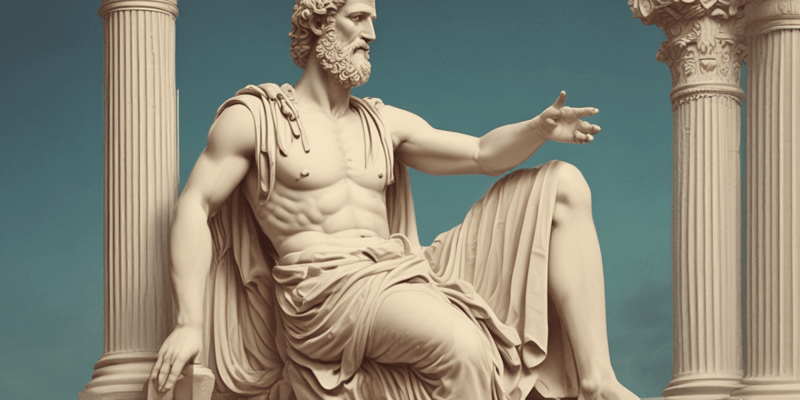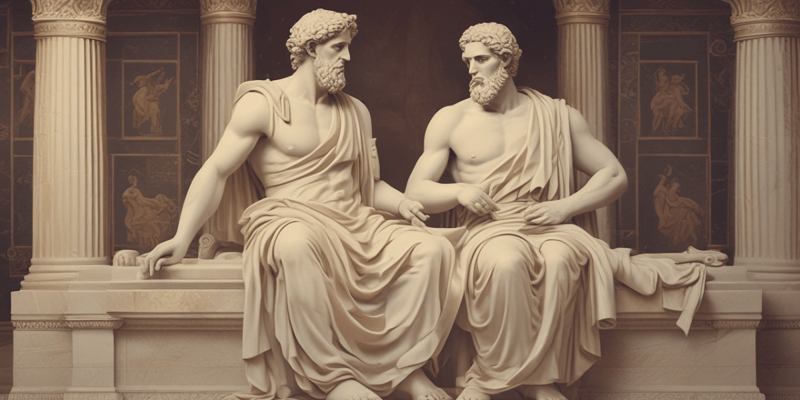Podcast
Questions and Answers
What is the focus of The Iliad?
What is the focus of The Iliad?
What is characteristic of Aristophanic Comedy?
What is characteristic of Aristophanic Comedy?
What is a characteristic of Aeschylean Tragedy?
What is a characteristic of Aeschylean Tragedy?
What is the significance of Greek mythology?
What is the significance of Greek mythology?
Signup and view all the answers
When did Ancient Greek Civilization flourish?
When did Ancient Greek Civilization flourish?
Signup and view all the answers
What is a key event in Ancient Greek Civilization?
What is a key event in Ancient Greek Civilization?
Signup and view all the answers
What is the name of the famous Athenian playwright known for his satirical comedies?
What is the name of the famous Athenian playwright known for his satirical comedies?
Signup and view all the answers
What is the title of one of Aristophanes' famous works?
What is the title of one of Aristophanes' famous works?
Signup and view all the answers
What is the title of one of Aeschylus' famous works?
What is the title of one of Aeschylus' famous works?
Signup and view all the answers
What is the name of the epic poem that narrates Odysseus' journey home after the Trojan War?
What is the name of the epic poem that narrates Odysseus' journey home after the Trojan War?
Signup and view all the answers
What is a key theme explored in The Iliad?
What is a key theme explored in The Iliad?
Signup and view all the answers
What is a characteristic of epic poetry?
What is a characteristic of epic poetry?
Signup and view all the answers
What is the name of the hero in The Odyssey?
What is the name of the hero in The Odyssey?
Signup and view all the answers
What is a key trait of Homeric heroes?
What is a key trait of Homeric heroes?
Signup and view all the answers
How many books do both The Iliad and The Odyssey consist of?
How many books do both The Iliad and The Odyssey consist of?
Signup and view all the answers
What is a theme explored in The Odyssey?
What is a theme explored in The Odyssey?
Signup and view all the answers
What is a characteristic of Homeric heroism?
What is a characteristic of Homeric heroism?
Signup and view all the answers
What is the significance of Homer's works in Western literature?
What is the significance of Homer's works in Western literature?
Signup and view all the answers
Study Notes
Homer's Epics
-
The Iliad:
- Tells the story of the Trojan War, focusing on the wrath of Achilles
- Comprises 24 books, written in dactylic hexameter
- Explores themes of honor, pride, and the human cost of war
-
The Odyssey:
- Narrates Odysseus' journey home after the Trojan War
- Consists of 24 books, also written in dactylic hexameter
- Examines themes of identity, loyalty, and the struggle between fate and free will
Comedy And Aristophanes
-
Aristophanes:
- Prominent Athenian playwright, active during the 5th century BCE
- Known for his satirical comedies, often targeting politics and social issues
- Famous works include The Clouds, Lysistrata, and The Frogs
-
Characteristics of Aristophanic Comedy:
- Uses humor, irony, and absurdity to critique Athenian society
- Often features fantastical elements, such as mythical creatures and supernatural events
- Typically includes a chorus, which provides commentary and context
Tragedy And Aeschylus
-
Aeschylus:
- Pioneering Athenian tragedian, active during the 5th century BCE
- Known for his contributions to the development of tragedy as a genre
- Famous works include The Persians, Seven Against Thebes, and The Oresteia
-
Characteristics of Aeschylean Tragedy:
- Explores themes of fate, morality, and the human condition
- Often features a tragic hero, whose downfall is caused by hamartia (tragic flaw)
- Typically includes a chorus, which provides context and commentary
Mythology And Legend
-
Greek Mythology:
- Rich collection of stories and legends, explaining natural phenomena and the workings of the universe
- Features a vast pantheon of gods and goddesses, including Zeus, Athena, and Apollo
- Includes stories of heroes, monsters, and legendary creatures, such as Perseus and the Minotaur
-
Importance of Mythology:
- Provided explanation and meaning for natural events and the human experience
- Influenced art, literature, and culture, shaping Greek identity and values
Historical Context
-
Ancient Greek Civilization:
- Flourished during the 5th and 4th centuries BCE, particularly in Athens
- Characterized by significant cultural, political, and philosophical achievements
- Key events: Persian Wars, Golden Age of Pericles, and the Peloponnesian War
-
Cultural Significance:
- Greek literature and mythology had a profound impact on Western cultural heritage
- Influenced Roman literature, art, and architecture, shaping the development of European civilization
Homer's Epics
- The Iliad tells the story of the Trojan War, focusing on the wrath of Achilles and comprising 24 books written in dactylic hexameter.
- The Iliad explores themes of honor, pride, and the human cost of war.
- The Odyssey narrates Odysseus' journey home after the Trojan War, consisting of 24 books written in dactylic hexameter.
- The Odyssey examines themes of identity, loyalty, and the struggle between fate and free will.
Comedy and Aristophanes
- Aristophanes was a prominent Athenian playwright, active during the 5th century BCE.
- He was known for his satirical comedies, often targeting politics and social issues.
- Famous works of Aristophanes include The Clouds, Lysistrata, and The Frogs.
- Aristophanic comedies use humor, irony, and absurdity to critique Athenian society.
- They often feature fantastical elements, such as mythical creatures and supernatural events.
- Aristophanic comedies typically include a chorus, which provides commentary and context.
Tragedy and Aeschylus
- Aeschylus was a pioneering Athenian tragedian, active during the 5th century BCE.
- He was known for his contributions to the development of tragedy as a genre.
- Famous works of Aeschylus include The Persians, Seven Against Thebes, and The Oresteia.
- Aeschylean tragedies explore themes of fate, morality, and the human condition.
- They often feature a tragic hero, whose downfall is caused by hamartia (tragic flaw).
- Aeschylean tragedies typically include a chorus, which provides context and commentary.
Mythology and Legend
- Greek mythology is a rich collection of stories and legends, explaining natural phenomena and the workings of the universe.
- It features a vast pantheon of gods and goddesses, including Zeus, Athena, and Apollo.
- Greek mythology includes stories of heroes, monsters, and legendary creatures, such as Perseus and the Minotaur.
- Greek mythology provided explanation and meaning for natural events and the human experience.
- It influenced art, literature, and culture, shaping Greek identity and values.
Historical Context
- Ancient Greek civilization flourished during the 5th and 4th centuries BCE, particularly in Athens.
- It was characterized by significant cultural, political, and philosophical achievements.
- Key events in ancient Greek history include the Persian Wars, the Golden Age of Pericles, and the Peloponnesian War.
- Greek literature and mythology had a profound impact on Western cultural heritage.
- They influenced Roman literature, art, and architecture, shaping the development of European civilization.
Homer's Works
- Homer's Iliad and Odyssey are epic poems attributed to him, set in the Trojan War and its aftermath
- The Iliad:
- Focuses on the wrath of Achilles, a Greek hero, and its consequences
- Comprises 24 books, with over 15,000 lines of verse
- Explores themes of honor, pride, and the human cost of war
- The Odyssey:
- Tells the story of Odysseus, a Greek hero, and his journey home to Ithaca
- Comprises 24 books, with over 12,000 lines of verse
- Explores themes of identity, loyalty, and the struggle between fate and free will
Epic Poetry
- A genre of poetry characterized by:
- Long, narrative form
- Elevated style and language
- Focus on heroic deeds and events
- Often features a heroic protagonist
- Epic poetry was a popular form of storytelling in ancient Greece
- Homer's works are considered some of the greatest examples of epic poetry
Homeric Heroism
- A set of ideals and characteristics embodied by heroes in Homer's works
- Key traits include:
- Bravery and martial prowess
- Loyalty and duty to family and community
- Honor and reputation
- Strength and athleticism
- Wisdom and cunning
- Homeric heroes are often flawed and human, with their own strengths and weaknesses
- The concept of heroism in Homer's works has had a lasting impact on Western literature and culture
Studying That Suits You
Use AI to generate personalized quizzes and flashcards to suit your learning preferences.
Description
Explore the world of ancient Greek literature with this quiz on Homer's epics and Aristophanes' comedies. Test your knowledge of classical Greek works and their themes.




